Aromatherapy: The Scented Path to Healing and Wellness
A Holistic Approach to Health and Well-being through Aromatherapy
Introduction to Aromatherapy
Aromatherapy is an alternative treatment that uses fragrances and natural plant oils to increase health capacity. It uses the therapeutic abilities of oils extracted from flowers, barks, stems, leaves, and roots to improve physical and spiritual health. Essential oils are generally used in holistic practices to treat various conditions and enhance health.
The Origins of Aromatherapy
Early Beginnings
Aromatherapy has been in practice for thousands of years making its origin traced back to early civilization. The Egyptians were the first civilization to discover the use of aromatic oils in their worship, beauty regimes, and healing processes. Even the early symbols and writings show that Myrrh and frankincense were critical components of ceremonial and health practices.
Greek and Roman Contributions
The Greeks and Romans took the practice of using aromatics to the next level. Even the ancient physician, the father of medicine, Hippocrates, stressed the use of aromatic baths and massages. He was convinced of the curative effects of aromatics and used them in his therapeutic practice.
The Romans for instance, famous for their bath and lavish living, embraced and developed them. They employed herbal oils in baths, massages and fumigation among other uses. The ancient Roman physician Galen also described the usage of essential oils for therapeutic purposes.
The Modern Revival of Aromatherapy
Rene-Maurice Gattefossé: The Father of Modern Aromatherapy
Aromatic plants have long been utilized in different ways; however, the term aromatherapy was developed by the French chemist Rene Maurice Gattefosse in the early twentieth century. Lavender oil’s therapeutic effects were first discovered by Jean-Baptiste Gattefossé when he used it to treat a burn on his hand. He soon recovered and his sudden interest in the pharmacological benefits of essential oils began. In 1937, he published "Aromathérapie: Founding the modern aromatherapy, “Les Huiles essentielles, hormones végétales.”
Jean Valnet and Marguerite Maury
After Gattefossé, Dr. Jean Valnet, a French army surgeon focused on the use of essential oils. He applied it in treating those who were affected by World War II and even came up with papers on how the same could be used. Austrian biochemist Marguerite Maury is also considered to be the founder of the emotional level of aromatherapy and the integration of the physical, mental, and spiritual aspects in the use of aromatherapy.
Aromatherapy Products
Aromatherapy products can be divided into a wide range of products: all of these products are aimed to convey in various ways the effect of essential oils. Here are some of the most popular aromatherapy products:
Essential Oils
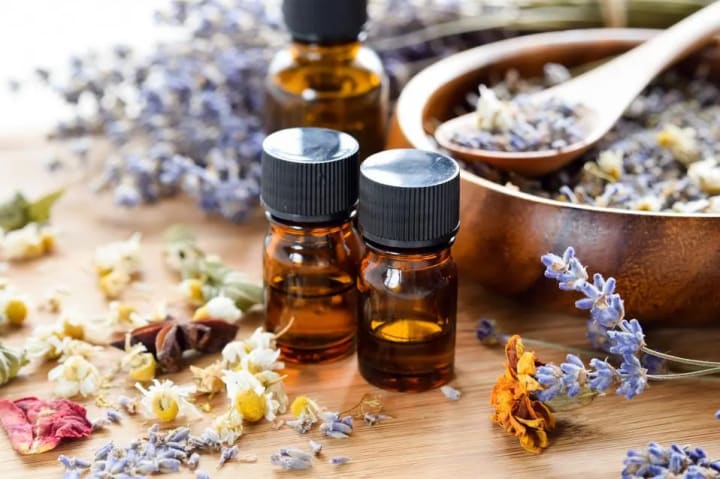
These concentrated plant extracts form the basis of aromatherapy, a treatment that dates back to the Egyptian period. They can be placed in diffusers, poured into bath water, or used on the skin if they are diluted with a carrier oil. Some popular essential oils include:
- Lavender: It is used widely mainly because of the relaxing effect it has on the skin and the whole body.
- Peppermint: Eaten to excite and further enliven people, sometimes to help digestion or cure headaches.
- Eucalyptus: He pointed out that it is now widely used for respiratory disorders and is a decongestant.
- Tea Tree: Popular due to its aseptic feature and extremely effective as an antibacterial agent in cosmetics.
Diffusers
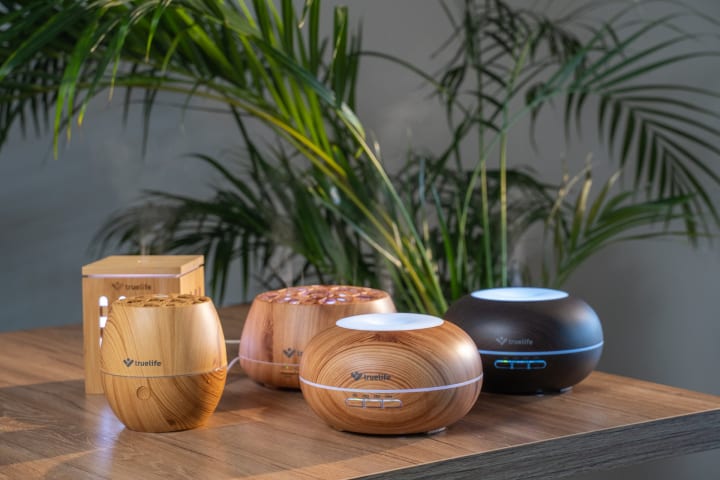
Air Purifiers, humidifiers, and ionizers ionize cool and warm air and release essential oils into the air, so the environment becomes enjoyable and therapeutic. There are several types of diffusers, including There are several types of diffusers, including:
- Ultrasonic Diffusers: Operate the device with a flow of water and ultrasonic waves to produce a mist.
- Nebulizing Diffusers: No dilution of oil with water or by using heat; ensure that the essential oils retain their clarity.
- Heat Diffusers: With a pinch of heat diffuse essential oils into the air and make it aromatic.
Aromatherapy Candles
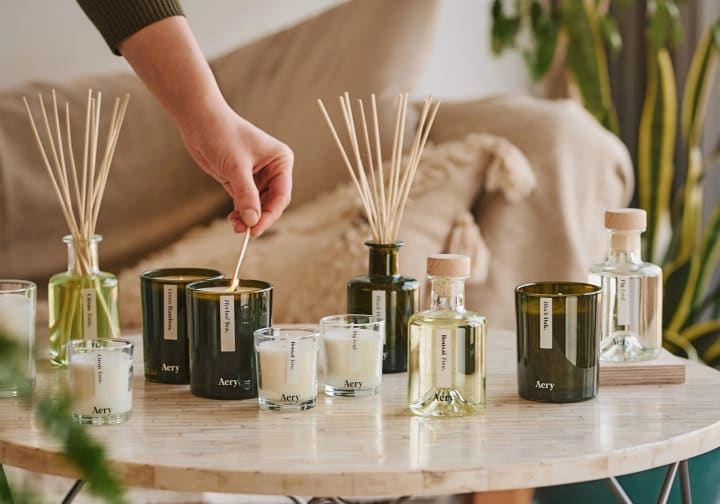
With substances sourced from plants, these candles serve as sources of light and also emit fragrances through the essential oils when they burn. They are mostly employed as a means to provide relaxation, and meditation as well as to supplement the demeanour of an area.
Bath and Body Products
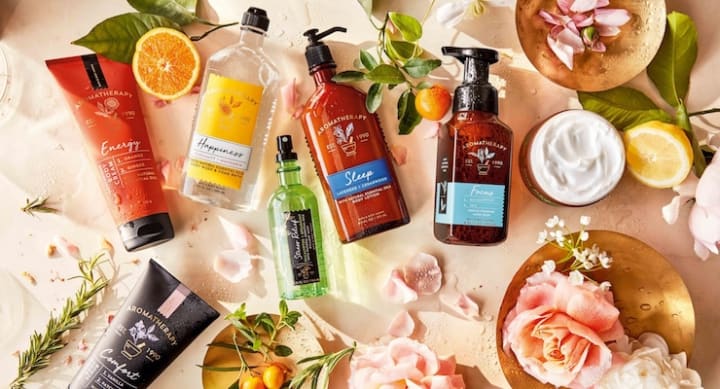
Aromatherapy is also incorporated into various bath and body products, such as:
- Bath Salts: Suspended in the bath gel and mixed with oils, they can complement the feeling of the bath and be useful for the body.
- Massage Oils: It is usually a blend of essential oils with a base oil, because they are applied during massage, and are vital for their therapeutic value.
- Lotions and Creams: These products include oils and lotions that are scented with essential oils as they help in skin nourishment and aromatherapy.
Inhalers and Roll-Ons
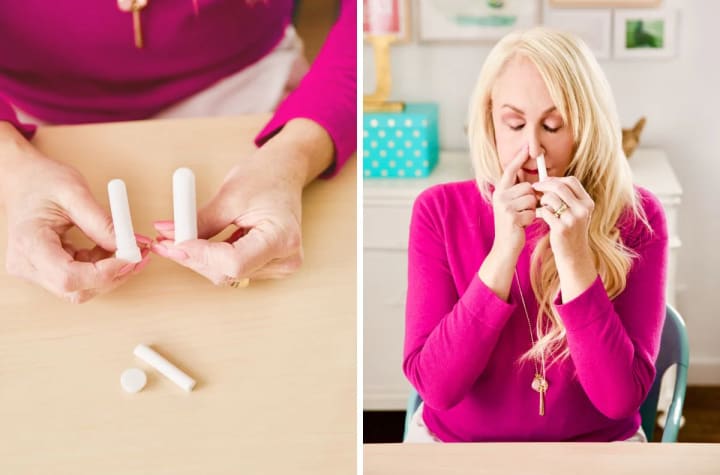
For those who are in a hustle to find easy and efficient ways to inhale essential oils, inhalers as well as roll-ons are recommendable. These products are somewhat mobile and can easily be applied being that they are not fixed.
Benefits of Aromatherapy
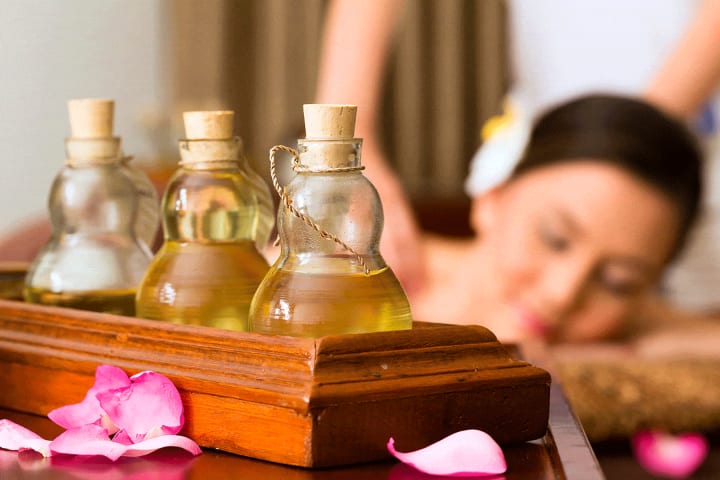
Aromatherapy is one of the most diversified fields as it is used in various ways to help humans.
- Stress Relief: Some of the oils including lavender and chamomile are popular for calming the nerves and have the potential to combat depression and anxiety.
- Improved Sleep: Relaxation is one key area in which aromatherapy can be used to improve sleep since it prepares the atmosphere for the appropriate environment for sleeping. Some oils such as lavender and sandalwood oils work best.
- Pain Management: For instance, the use of special oil like peppermint oil or the eucalyptus oil has a great significance in the reduction of pains and inflammation.
- Enhanced Mood: Essential oils such as orange or lemon have been linked to mood enhancement while their fresh smell is known to energize the body.
- Boosted Immunity: Techniques that include the use of tea trees and eucalyptus have antibacterial and antiviral qualities essential for boosting the immune system.
Summary
Beneficial for centuries, aromatherapy remains a highly effective means of promoting the wellness of body and mind today. Taking us through the historical and current ways of using essential oils for cure, the application of these oils can be described as an all-natural one. Through the use of oils, diffusers and other products, aromatherapy lowers a great standard of essential benefits to human health and thus plays an important role in holistic wellness care.
About the Creator
Swarnab Paul
I am a blogger from webgiginfo company.
Enjoyed the story? Support the Creator.
Subscribe for free to receive all their stories in your feed. You could also pledge your support or give them a one-off tip, letting them know you appreciate their work.







Comments
There are no comments for this story
Be the first to respond and start the conversation.